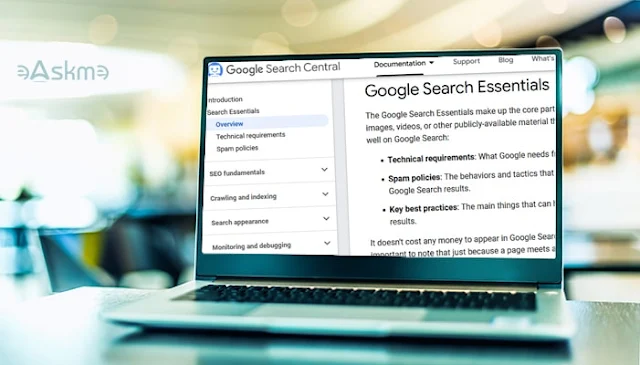Google is finally rebranding Webmaster Guidelines as Google Search Essentials.
Google has made it clear that Webmasters is an outdated term.
Google Search Essentials is the new and simplified version of Google Webmaster Guidelines.
 |
| Rebranding Google Webmaster Guidelines with Google Search Essentials: eAskme |
The main idea behind this rebranding exercise is to eliminate the term “Webmasters.”
Google had already removed webmaster when the company rebranded “Google Webmaster Central” as “Google Search Console.”
According to Google, webmasters do not include all content creators trying to rank their content in SERP.
Google Search Essentials:
All the Google Webmasters Guidelines are moved to different sections in Google Search Essentials.
Google Search Essentials displays 3 essential categories, such as;
- Technical Requirements
- Spam Policies.
- Key Best Practices
I am explaining what you can find in these categories.
One thing for sure is that Google is not removing any critical content from the sections and not adding anything new to their existing Google Webmasters Guidelines.
Google Search Essentials only displays the same content in a different format.
What is included in Google Search Essentials?
Technical Requirements:
In the Technical requirements section, you will see what is necessary for the webpage to rank in Google search results.
According to Google Search Essentials, most websites clear the technical requirements without doing anything.
Google Search Essentials Technical requirements are:
- Allow Googlebot
- Page loads without error
- Indexable content
Simply put, your content should be according to Google search guidelines, and the page should be indexable.
It is an essential requirement that most of the sites are already fulfilling.
Remember: Ranking your page on Google takes a lot of work.
Spam Policies:
Google is strictly against spamming. You will find spam policies you must follow to rank your webpage in Google and avoid de-indexing.
Google Search Essentials Spam Policies include:
- Cloaking
- Copyright removal requests
- Doorways
- Hidden Text and links
- Hacked Content
- Keyword Stuffing
- Link Spam
- Misleading functionality
- Malware and malicious behavior
- Machine-generated traffic
- Online Harassment removal
- Scraped content
- Auto-generated content
- Sneaky redirects
- Scam and Fraud
- Thin Affiliate Pages
- User-generated spam
You may have already seen these topics in Google Webmaster Guidelines.
Key Best Practices:
You can do many things to improve your content and SEO.
But there are a few things that Google wants you to take care of to improve your search engine ranking and presence.
Google Search Essentials Key Best Practices are:
- Create people-first, helpful and reliable content.
- Place keywords in the Title, main headings, alt text, and link text.
- Ensure that links are crawlable.
- Share about your products and services in online communities.
- Follow best practices for Javascript, Structured data, videos, and images.
- Enhance your rich snippets.
- Control how your content appears in Google search results.
Conclusion:
Rebranding is not a new thing. Not only Google but Bing has also rebranded and Microsoft Bing.
Google is completely removing webmaster terms from their pages.
From now, you will see Google guidelines in Google search essentials.
The updated guidelines from Google will help webmasters to avoid meaningless content.
Google has explained everything in its blog and Google Search Essentials page.
If you still have any question, feel free to ask me via comments.
If you find this article interesting, don’t forget to share it on Facebook, Twitter or Google Plus with your friends and family.
Don't forget to like us FB and join the eAskme newsletter to stay tuned with us.
Boost Your SEO with These Handpicked SEO Article for You:










